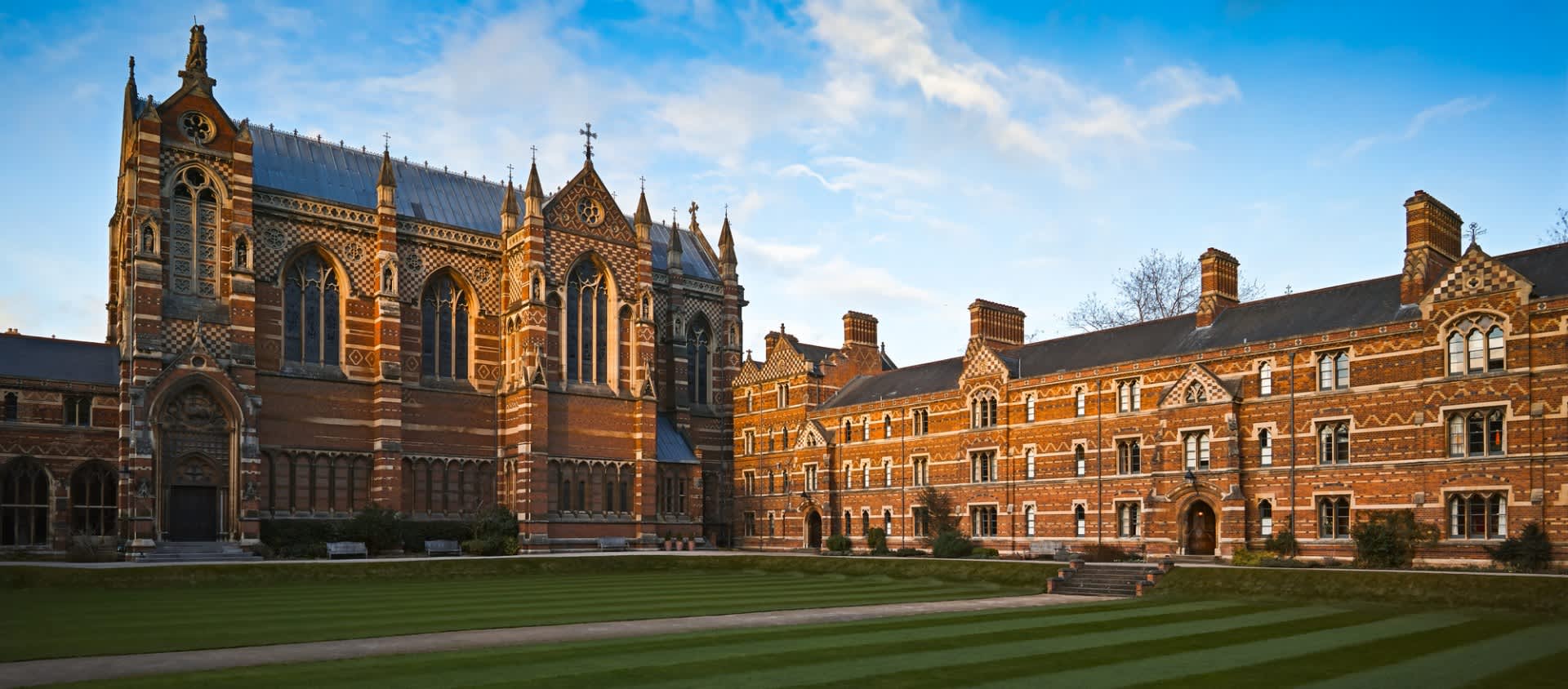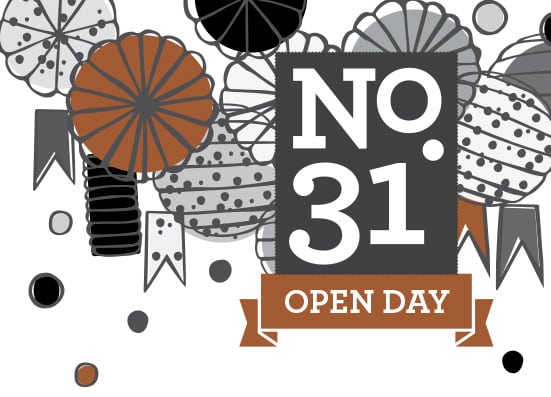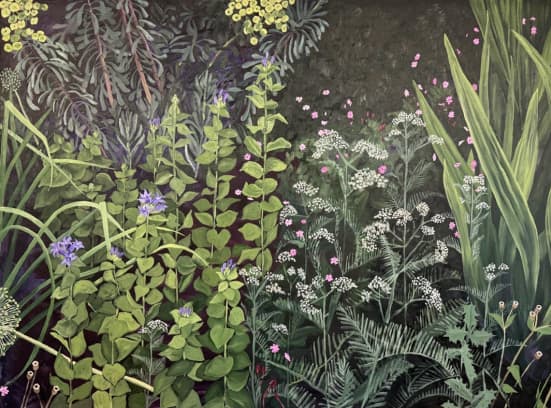This month Keble College will hold its 12th Holocaust Memorial Day service, which welcomes the sounds of both Keble College Choir and that of the Oxford Jewish Congregation, OxfordShir. The latter is named for the Hebrew word for song, Shir. “It seems to work,” conductor John Dunston says warmly of the wordplay. He and I are both guests of Nevsky Everett, Chaplain at Keble. What the college does each year to mark Holocaust Memorial Day, says Everett, “is quite distinctive, and began in the time of my predecessor's predecessor”.
That was Allen Shin who, Dunston points out, championed the importance and symbolism of both Keble College Choir and OxfordShir “joining together in this act of worship, and having readers drawn from both the Jewish and Christian communities”. Over the years, he says, the number of people attending has grown. The service itself “has remained almost unchanged, and I think that's testament to Keble's vision in setting up this remarkable event 12 years ago; still unique in Oxford and Cambridge colleges as far as I know.”
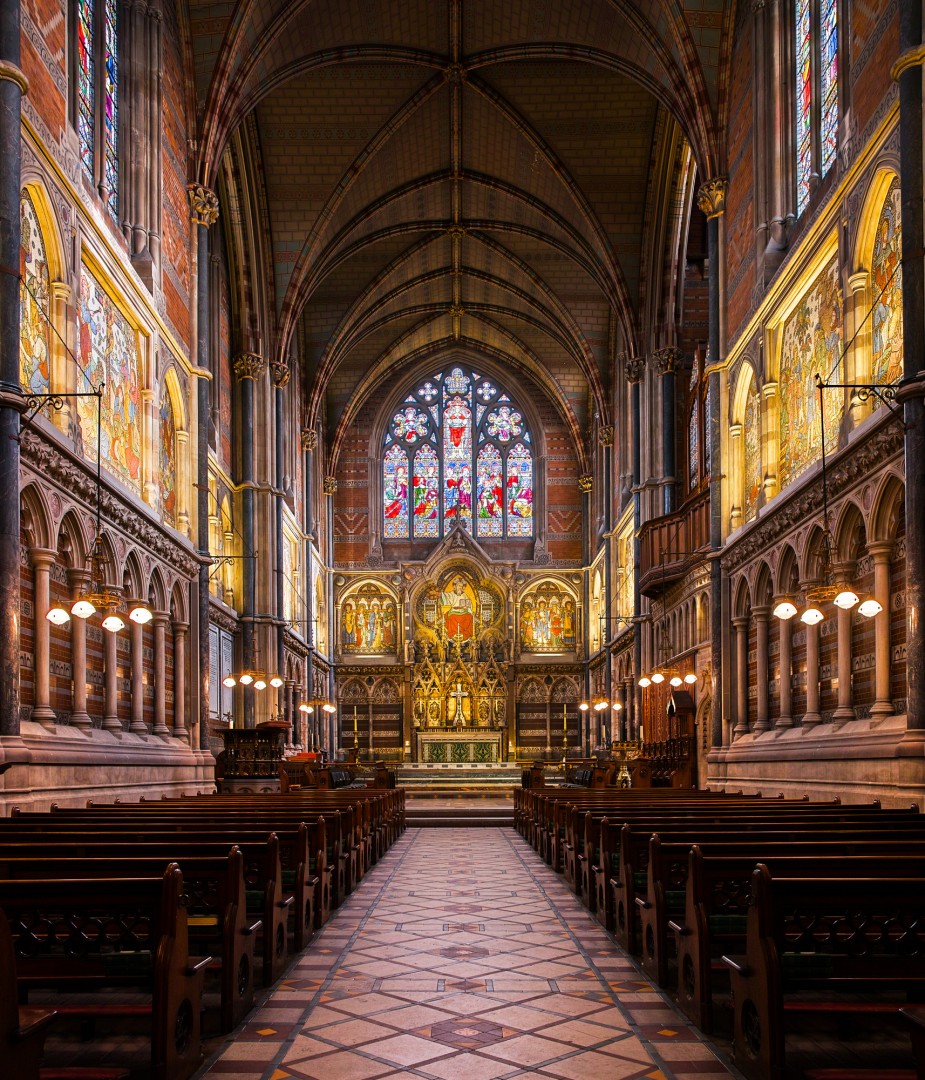
In the quarter-century it’s been active, OxfordShir have toured to Paris and sang in a number of cathedrals and synagogues, but “one of the most important events in our annual calendar is this Keble Holocaust Memorial Day service,” he states. “In a way it's the centre point of our calendar – I wouldn't have been able to say that years ago, but as time has passed it's become terribly significant.”
Taking place in Keble’s stunning chapel, it comprises readings from the Book of Lamentations as well as some from the time of the Holocaust. Each year there is also a guest speaker. In 2018 this position was filled by Patrick Moriarty, an ordained Church of England priest and headmaster of the Jewish Community Secondary School. “Isn't that wonderful?” says Dunston. “I feel a real bond because I used to be the Jewish headmaster of a Quaker school. All this cross-faith cooperation, collaboration, goes beyond the touchy-feely, 'isn't it nice to be together?' – these things goes much deeper and Keble is in that mould.”
“It's a happy coincidence,” Everett says, that in the year HMD has ‘Torn from home’ as its theme, the speaker this time round is Lord Dubs, who arrived in England via Kindertransport in 1939 and thus “can speak very authoritatively” about this issue. The theme, he resumes, “in our current age, has lots of very deep resonance for people across the world who've been torn from their homes by war, terrorism and persecution”.
Has the event gained more importance of late due to recent stories suggesting a rise in antisemitism? “It's certainly why it's important to continue to mark Holocaust Memorial Day,” he says, “to continue to reflect as people of faith on what happened in the past and to think about what that means in our own time.”
“The service is always a time of hope,” adds Dunston, “and even optimism despite the dreadful events we're commemorating. It's not a relapse into misery and self-contemplation. We're remembering what happened and this is a spiritual reflection of our understanding that there is a positive response for the future that we need to have even more at the forefront of our minds now, as the old antisemitism – always in new forms – begins to emerge again after some decades.”
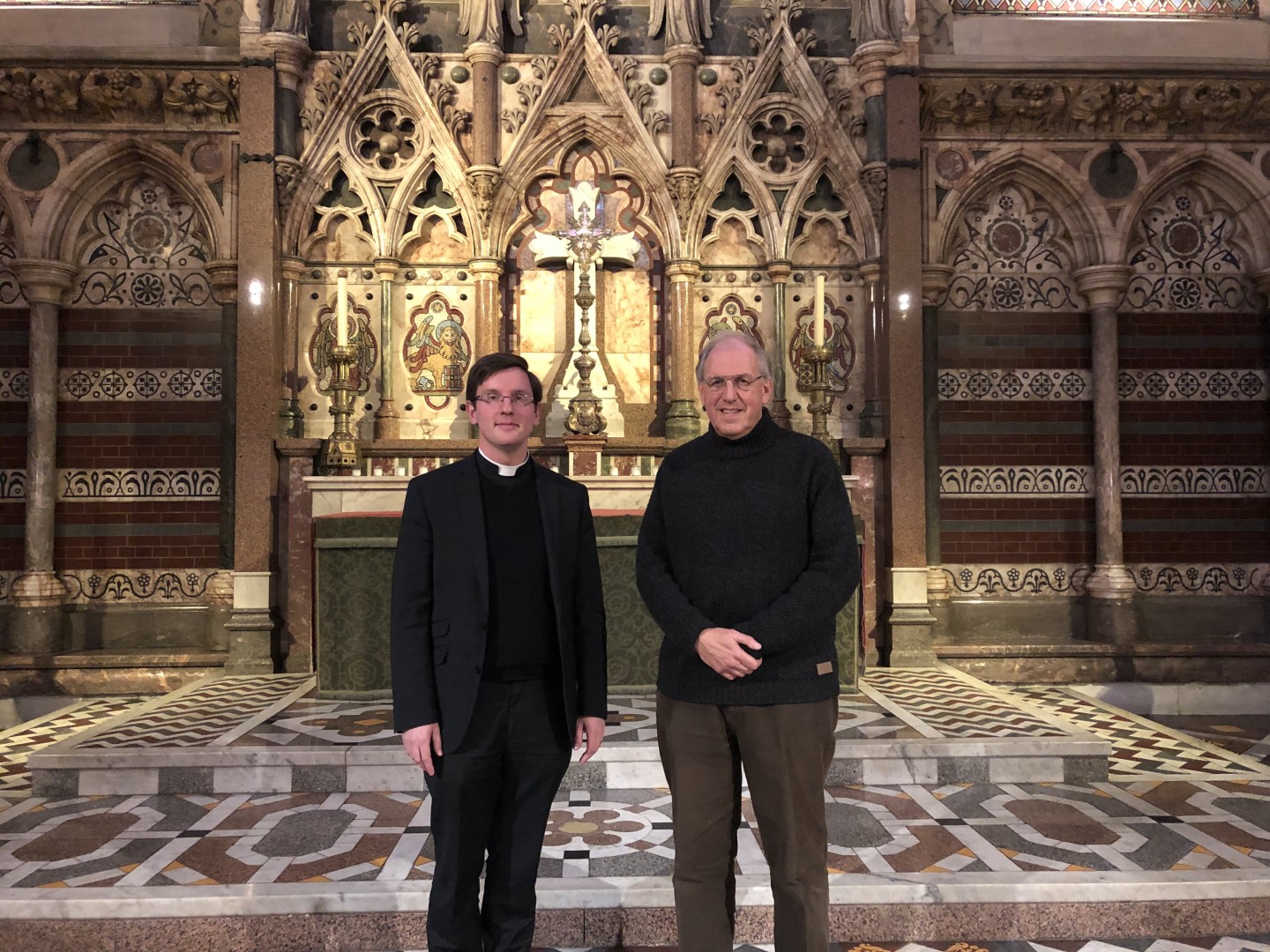
Holocaust Memorial Day. Is one day enough? “I would hesitate to offer an answer,” he says. “The only alternative would be 365 days, but we can't live our lives constantly in the shadow of the Holocaust, even though there'll be scarcely a Jewish family not affected by it – including mine, most of my father's family were murdered in the camps. There is a future. And we grow. We go through our lives trying to avoid any residual feelings of hatred or division, recognising that it's much more important to build bridges than to perpetuate someone else's hatred, or even God forbid adopt it – which Jews haven't. The fact that there is a day seems to me to be of enormous significance. I can't put another number on it, if I were to say two, you would rightly say, 'Is that enough?' No, it's not, nothing is enough – except whatever we do has to be enough, and we have to make the best of it. There are days in all religions, I think, that are set aside for particular thoughts and reflections. This is one which to my mind is not a Jewish day because the Holocaust is not a Jewish problem. The Holocaust is the world's problem because it is the ultimate example of where hatred and discrimination will lead if unchecked. And the fact that around the world now there is this commemoration seems to me a remarkable achievement, and one that has to be treasured and nurtured because these things can't be taken for granted, they can disappear. It's very important we protect it for future generations.”
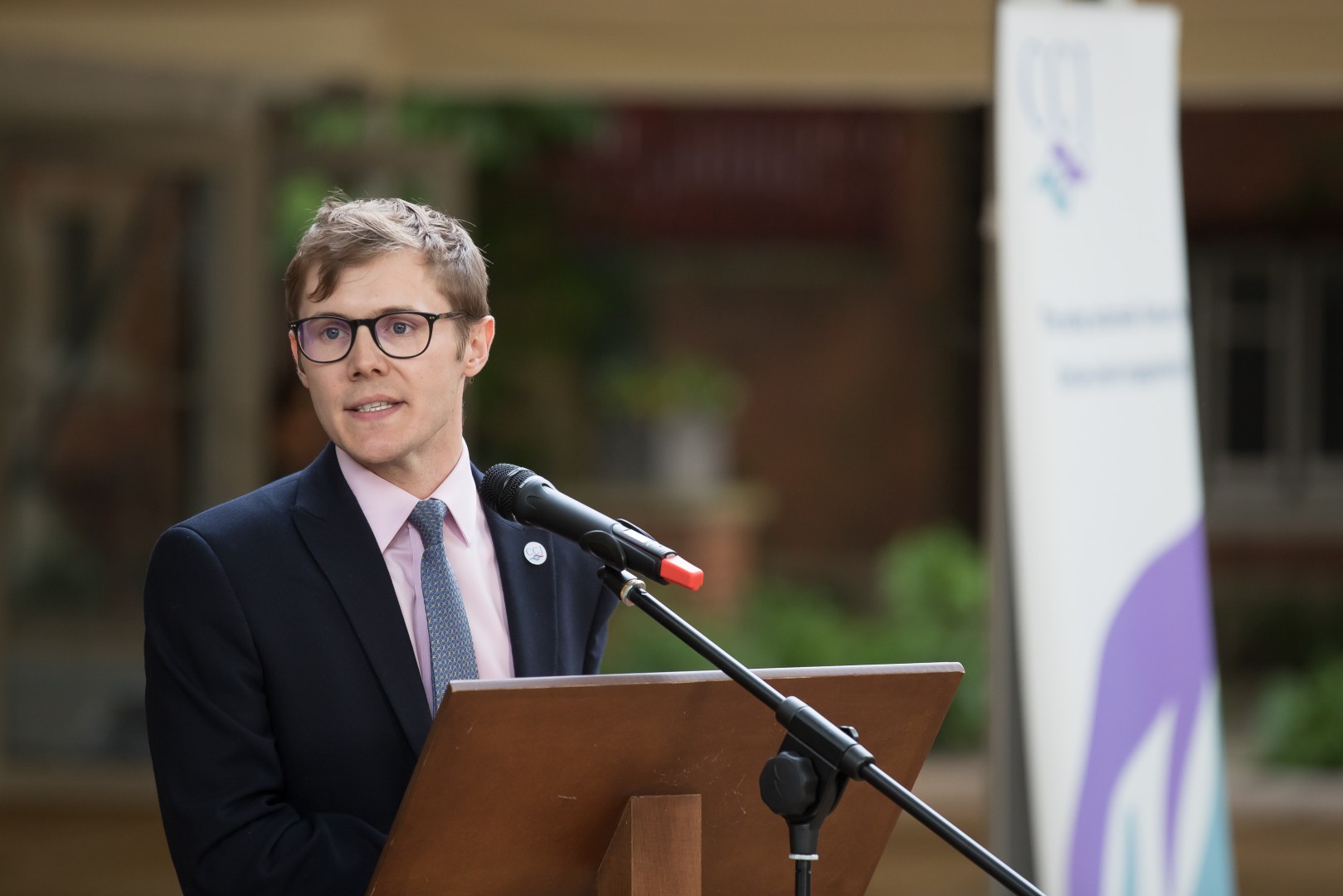
At Keble’s service, a collection will be taken to support the work of the Council of Christians and Jews UK, ‘the leading nationwide forum for Christian-Jewish engagement’ for which Rob Thompson is senior programme manager. I speak to him just days before an event CCJ are holding at Lambeth Palace to commemorate the 80th anniversaries of the Kindertransport and Kristallnacht, with the Archbishop of Canterbury and the Chief Rabbi. Such markings, he says, neatly tie in with the aforementioned HMD theme.
“When I speak to people as they prepare for Holocaust Memorial Day, the first things that come into their minds when they think of ‘Torn from home’ are people being transported from their homes, being led into ghettos and camps. But also there are all these questions about what happens to home for someone who's survived genocide. Is it possible to rebuild home? And of course there are all sorts of current and contemporary issues like the migration crisis, Syrian refugees, and refugees from North Africa. The idea of displacement of people is very live today, and it poses quite hard questions for us about whether we are able and willing to provide homes for people who need them.”
Antisemitism hasn’t disappeared, has it? I say. “Antisemitism is rising. That's part of a wider trend in which we've seen hate crime increase since the Brexit referendum. In a climate when politics is becoming a lot more polarised, there is a context where extremism and prejudice – particularly antisemitism – are able to grow. It's not something that just exists online, in political parties or on the fringes of politics. There are subtle prejudices that people continue to have about Jews which slip into everyday conversations.”
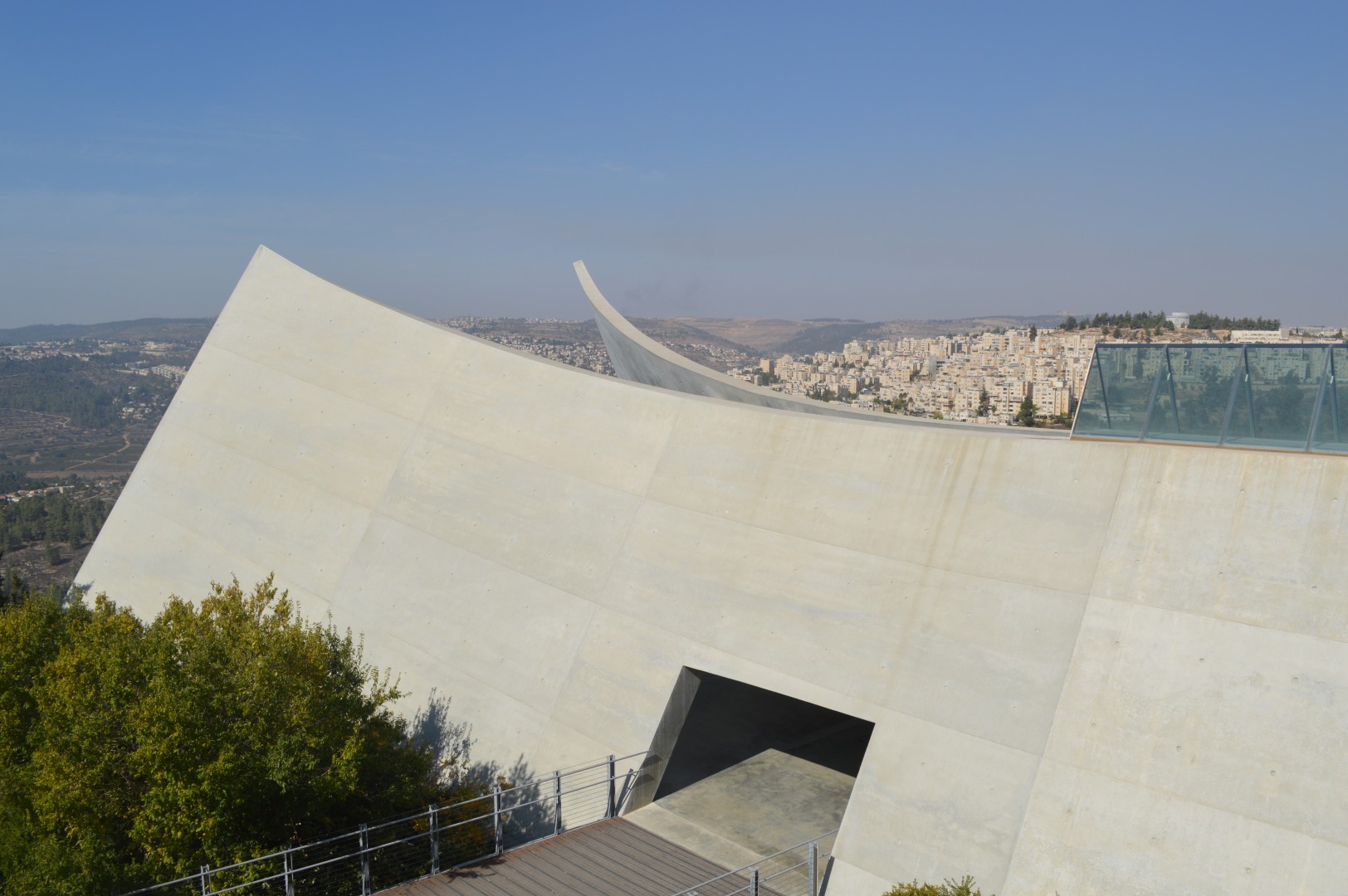
He’s not long returned from ten days in Yad Vashem, “the international school of Holocaust studies in Jerusalem. We have an annual seminar there, where we teach clergy about the Holocaust and equip them to become Holocaust educators. Our particular concern is promoting good relations between Jews and Christians, and there's still work we need to do to ensure the church is free of anti-Judaism. There is a very long history of Christian persecution of Jews which led in many ways to the Holocaust. The church still has a lot to do to learn from that history, and promote genuinely good relations with Jews today.”
But is the church trying to do so? “Since the Holocaust the churches have made particular efforts to improve those relationships and individual church leaders have very good relationships with individual Jewish communities. There's still a need for clergy and church leaders in particular to see antisemitism as something that in every generation we have to continually address.”
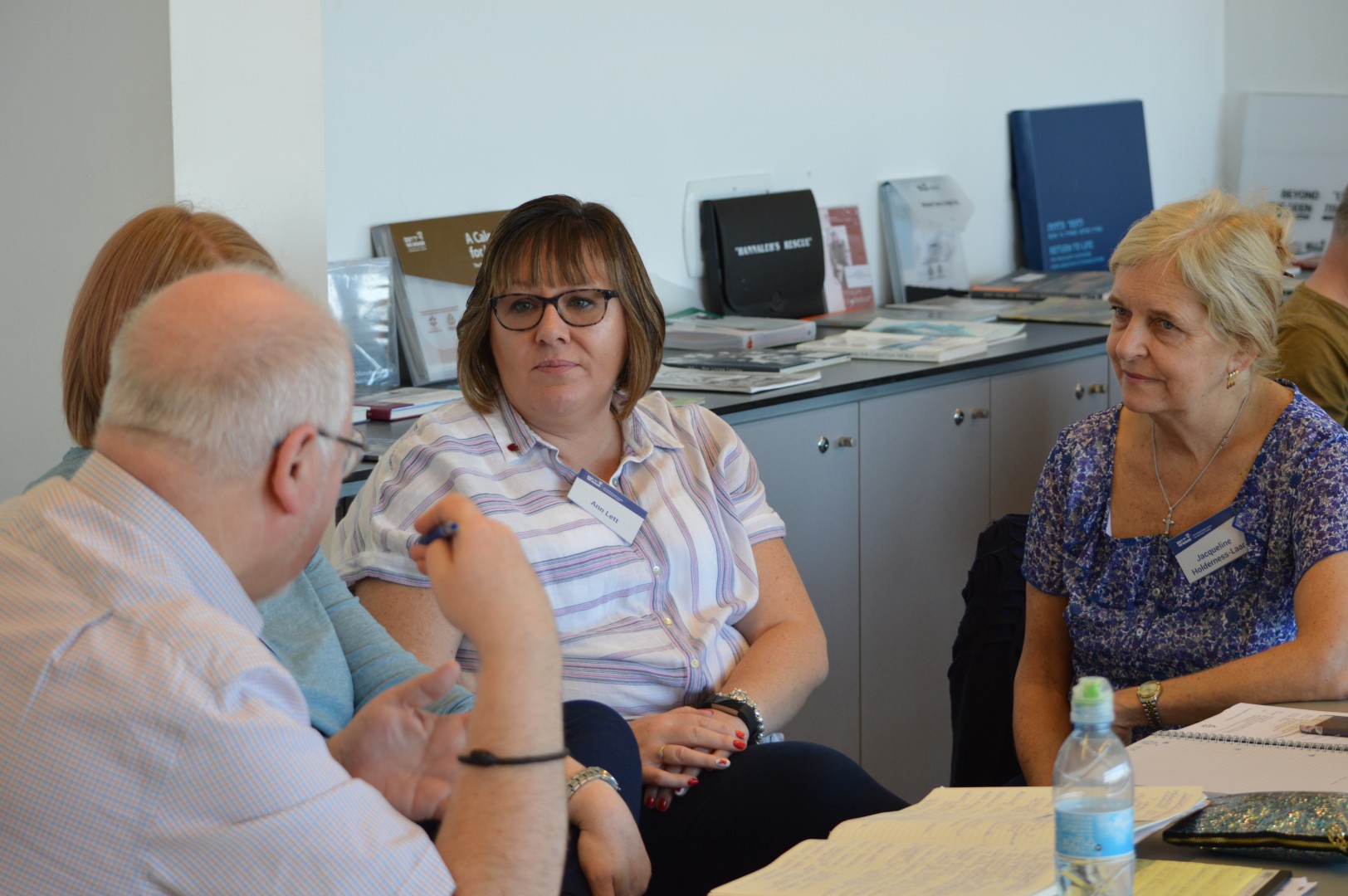
Jackie Holderness at 2018’s Yad Vashem seminar
Jackie Holderness, cathedral education officer at Christ Church, was in attendance at CCJ’s Yad Vashem seminar last year. She’ll give a talk about the ‘Torn from home’ theme at Christ Church’s Holocaust Memorial Day workshop, which also features a talk from Martin Gorick (archdeacon of Oxford) about the history of Oxford’s Jewish community.
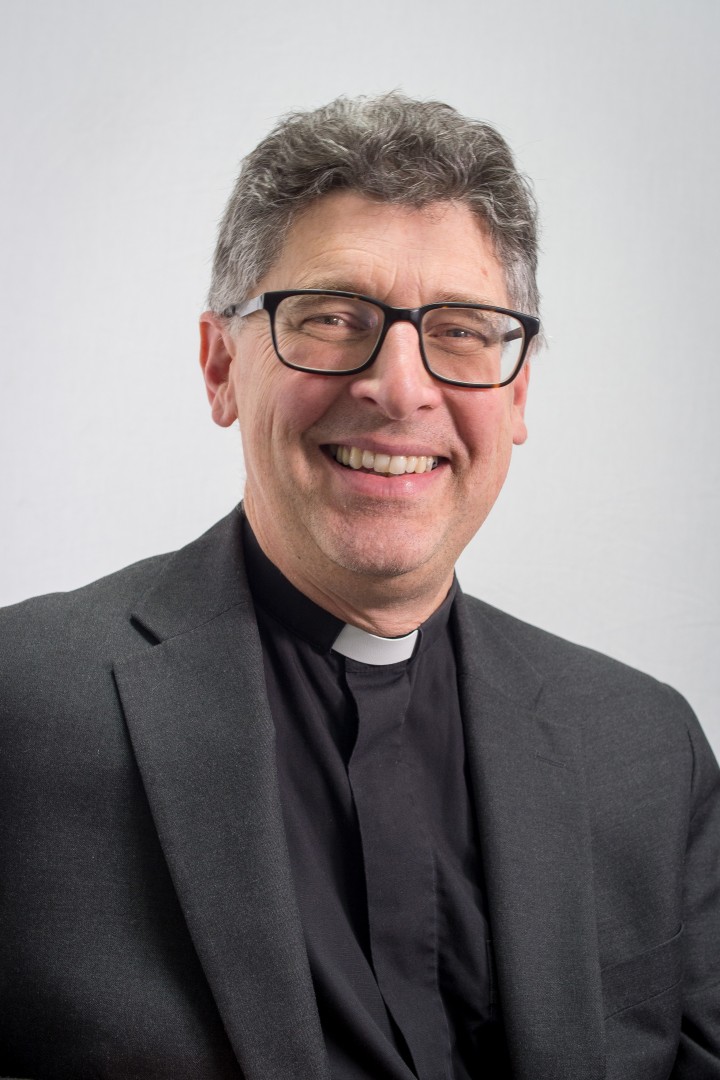
Jews existed in England certainly from 1100, but were all expelled in 1290 under Edward I, not returning until the rule of Cromwell. Prior to their expulsion, Gorick explains, their “contribution was huge”. Oxford’s earliest students often lived in accommodation rented out by Jews of the city, “and the first purpose-built student halls were built by the Jewish community”. Jews were initially brought to England from France, he says, “primarily to act as money lenders to help finance all the Norman building that went on in England. Jews are often caricatured as money lenders, but what people don't always realise is they were persecuted really right from the start in Europe, and this was one of the few occupations they were allowed to do. Money lending is looked down on in certain religious and scriptural traditions; it was seen as an unclean occupation, but obviously a useful occupation for society, so it was put on the Jews to do it. They often did it very capably but it did put them in a very vulnerable position because people often owed them huge amounts of money.”
One lender was a Jew known as David (d.1244). “One man owed him over £1,000 – which in the 1200s was a huge amount. The person who owed David went to fight in the crusades, and the King remitted his debt (the King of England could remit debt as a favour to a friend or a reward for a person fighting in the crusades). David just had to swallow the loss of all that amount of money.
“When he died he was still a very wealthy man. A third of his total wealth was immediately taken by the Crown as death duty, all his coffers of money were sealed and transported to Windsor Castle, and his substantial property in Great Jewry [now St Aldates] was handed over to the House of Converts in London – paying for the upkeep of Jewish converts to Christianity. The site of his house was eventually taken over by the town – it's now the site of the Town Hall – and then his widow was ordered to pay a fine of £3,000 direct to the King; that money was used to make one of the largest contributions to the rebuilding of Westminster Abbey – I always think of that when I see it today. His widow was left, having been the wife of the wealthiest man in Oxford, in a poor cottage behind what's now Christ Church. That was the kind of thing that was happening at that time, wholesale stealing of Jewish property and money.
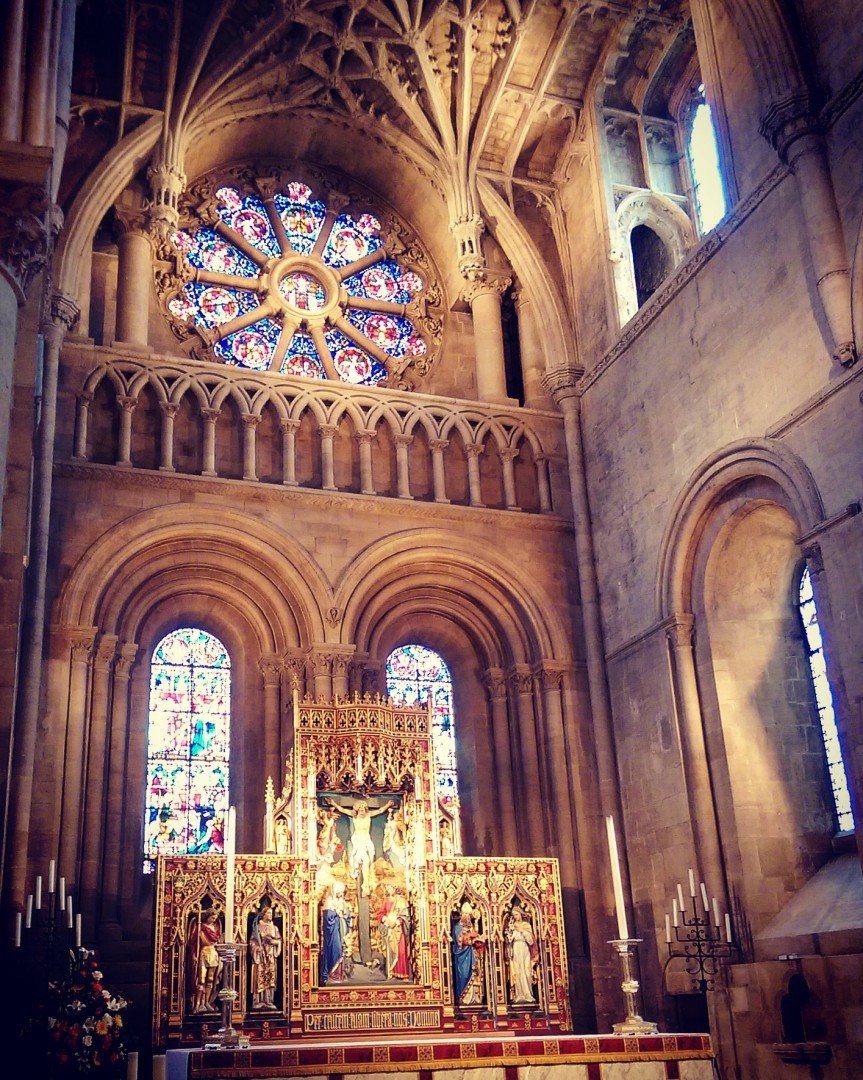
“Antisemitism,” the archdeacon says, “has been a feature of European and English life definitely since the 1100s-1200s, and the story of [Oxford’s Jewish] community is really sobering.” He tells me of a Christian who fell in love with a Jewish woman in Oxford and converted to Judaism. “He was put on trial and burnt at the stake in 1222.” In medieval Oxford, I also learn, “Jews were not allowed to bury their dead. If anyone died they had to take them to London where there was a Jewish cemetery – so that was pretty horrendous for them.” The Jewish community did eventually get a cemetery on a plot of land where Magdalen College now stands. Then in a move typical of that time, “another group decided they wanted to buy that plot of land because it was really nice – they wanted to build what's now Magdalen College (though it wasn't a college at that time). The Jews had to move over the road to what was more of a wasteland, they resumed their cemetery there.” That site is now the Rose Garden, near the Botanic Garden, at which a memorial stone was laid in 2012.
Centuries on Oxford would show a kinder side. “Just overlooking my garden are the rooms where Albert Einstein lived when he was a visiting professor at Christ Church. The dean brought him here because his life and work were in danger in Germany.” One fellow objected to the move, thinking it outrageous to give money to a German and a foreigner, but Einstein was brought to the city nonetheless – and “was quite brilliant, of course”. The physicist ended up in America in the 1930s, and encouraged Christ Church to put the money they were giving him for his professorship towards bringing other Jewish scholars to England, “effectively rescuing them from the Holocaust – not that it was known it would reach that level at that time”.
He says relations today between Oxford’s different faiths are “very positive”. As interfaith advisor for the Diocese of Oxford, “One of my roles is to lead all of our relations, as the Church of England, with other faiths; so I've always been very keen to develop excellent relationships with Muslims, Hindus, Sikhs, and Jews which I'm very glad to say we have. The Oxford Council of Faiths is a key group that meets together regularly and we ensure we support one another as faith communities and citizens.” He recently attended the vigil held by the Oxford-Jewish Society after a gunman killed 11 people at Pittsburgh's Tree of Life synagogue. “We go to one another's memorials [and] support each other in much happier times too.”
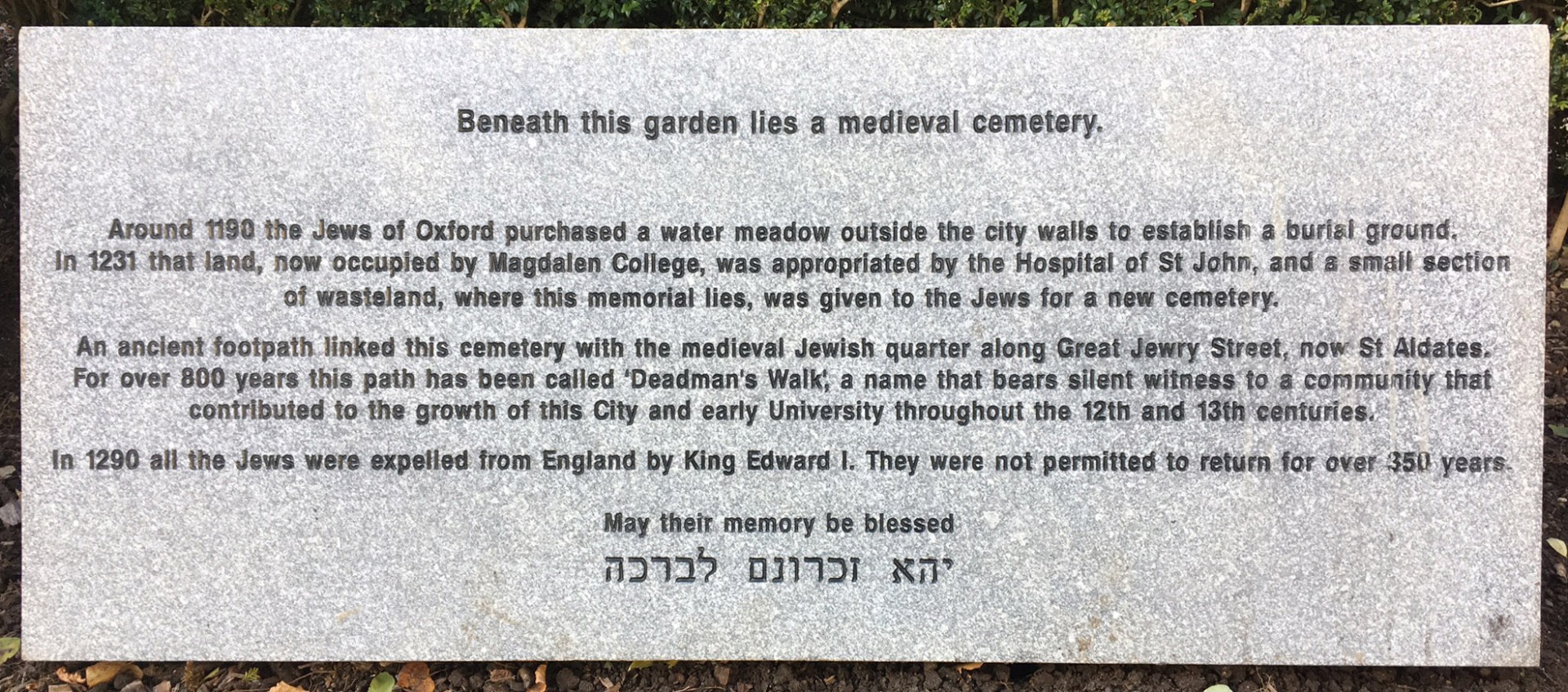
__________________________________________________________________________________
Holocaust Memorial Day takes place 27 January. hmd.org.uk
Keble College Holocaust Memorial Service takes place 27 January, 5:30pm, Keble Chapel. www.keble.ox.ac.uk/about/events/holocaust-memorial-day-service
Christ Church’s Holocaust Memorial Day course, in partnership with Oxford Jewish Centre and the Museum of Oxford, takes place 25 January, 9:30am-3:45pm. www.chch.ox.ac.uk/events/visiting-and-learning/holocaust-memorial-day-2019
The Council of Christians and Jews: ccj.org.uk

